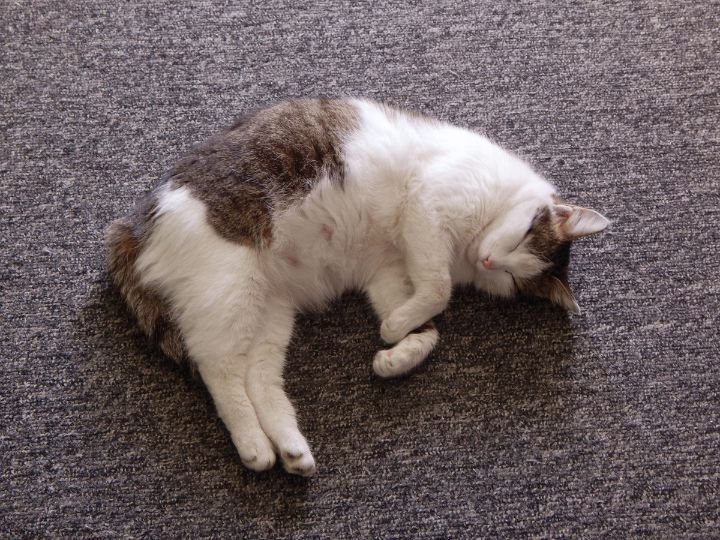Are you new to having a pet cat and wondering if she’s pregnant or not? On average, a healthy cat can have four pregnancies in an year. It can be confusing and even stressful when you’re not sure what’s happening with your cat or how long it’ll last. Maybe she’s acting differently, eating more, or hiding in quiet corners. You might be asking: Is she pregnant? And if so, what’s the cat pregnancy duration?
A cat’s pregnancy usually lasts between 63 to 65 days, or roughly 9 weeks. During this time, she may show signs like increased appetite, weight gain, and nesting behavior. An ultrasound can confirm pregnancy around the third week. Providing proper nutrition and a calm environment is essential for a healthy pregnancy.
Knowing this can ease a lot of your worries. When you understand the timeline and what to expect each week, you’ll feel more prepared and less anxious about what’s coming next. Keep reading to find out how long cat pregnancy really lasts, what signs to look for, and how to support her every step of the way without second-guessing yourself.
How Long Are Cats Pregnant?
Cats are typically pregnant for about 63 to 65 days, which is roughly 9 weeks. However, cat pregnancies don’t always follow the exact same timeline. The cat gestation period can range from 58 to 72 days, depending on factors like the individual cat’s health, age, breed, and whether it’s her first pregnancy.
Cat pregnancy time can be roughly broken down into three stages, each lasting about 20 days, though the first two stages are often hard to tell apart without veterinary help. In some cases, especially with first-time mothers, the pregnancy might last a little longer. Just like with humans, kittens can sometimes be born a bit earlier than expected, so there is some natural variation in timing.
How to Know If Your Cat is Pregnant?
To know if your cat is pregnant, look for early signs like behavioral changes, weight gain, and enlarged nipples. A visit to the vet can provide confirmation. Following are the signs of cat pregnancy:
- Swollen, pink nipples
- Weight gain
- Increased appetite
- More affectionate or more withdrawn behavior
- Nesting behavior
- Visible fetal movement (later stages)
Stages of Cat Pregnancy
| Stages | Time | What Happens? |
| Stage 1: Fertilization | Week 1 | Mating triggers ovulation and fertilization No visible signs yet |
| Stage 2: Early Pregnancy | Week 2-3 | Embryo implants itself in the uterus Nipples begin to enlarge and turn pink (called “pinking up”) Mild decrease in appetite Slight behavioral changes (more affectionate or withdrawn) |
| Stage 3: Mid-pregnancy | Week 4 | Fetuses develop limbs and organs Belly may start to swell slightly Morning sickness may occur Vet may detect pregnancy through palpation |
| Week 5 | Vet can confirm pregnancy via ultrasound The abdomen becomes noticeably rounder Increased appetite Continued nipple enlargement | |
| Stage 4: Late Pregnancy | Week 6 | Fetuses grow rapidly and become more active Belly grows larger and more defined Behavior becomes more nurturing or protective Seeking out quiet or hidden areas |
| Week 7 | Movement of kittens may be felt or seen through the belly Appetite remains highMore frequent rest | |
| Week 8 | Nipples may leak a little milk Belly appears very large and low Begins preparing nesting area | |
| Stage 5: Labor | Week 9 | Cat prepares to give birth (queening) Restlessness, pacing, and grooming more than usual May stop eating 24–48 hours before labor Licking genitals or vocalizing more Body temperature may drop slightly |
How to Confirm if Your Cat is Pregnant?
The best way to confirm if your cat is pregnant is by taking her to a veterinarian for a proper diagnosis. A vet can accurately assess her condition and rule out pseudopregnancy, which is when a cat shows pregnancy-like symptoms without actually being pregnant. Here are some of the methods used:
- Physical examination: The vet may gently palpate your cat’s abdomen from around three weeks into the potential pregnancy to feel for developing fetuses.
- Ultrasound: As early as 2 to 3 weeks, an ultrasound can help detect the presence of embryos.
- X-ray: Typically done after day 45, this imaging test not only confirms pregnancy but also helps determine the number of kittens.
- Hormonal tests: Although less common, blood tests can detect certain hormonal changes associated with pregnancy.
Signs That Your Cat Is In Labor
Here are the common signs that indicate your cat is in labor:
- Restlessness and nesting behavior: She may pace, cry, or seek out a quiet, secluded place to give birth.
- Vocalization: Increased meowing, yowling, or growling may signal discomfort or contractions.
- Licking her vulva: This is a sign that labor is near, as she prepares for delivery.
- Drop in body temperature: Her temperature may drop below 100°F (37.8°C) about 12–24 hours before labor.
- Refusal to eat: Many cats stop eating shortly before giving birth.
- Contractions and abdominal straining: Visible tightening of the belly followed by straining means active labor has begun.
- Discharge from the vulva: A clear, pinkish, or slightly bloody discharge is normal just before kittens arrive.
When to Call the Vet?
If your pregnant cat has strong contractions for over 20 minutes without delivering a kitten, or if a kitten is visible but not delivered within 10 minutes, seek veterinary help immediately.
How Long Does Cat Labor Last?
Cats labor usually lasts for about 4 to 6 hours, but it can vary depending on the number of kittens and the individual cat. Each kitten typically takes 5 to 30 minutes to be born once active pushing begins.
Some cats may take breaks between kittens, sometimes pausing for up to 24 hours. As long as your cat is calm and not straining, this can be normal. However, prolonged contractions without progress should prompt a call to the vet.
After each kitten, the placenta is delivered. It’s normal for your cat to eat the membranes or placenta, as this is part of her natural instinct. A greenish-black discharge may appear during this stage, which is usually normal.
What Can Cause Early Labor in Cat?
Early labor in cats can occur due to several health and environmental factors. Early labor in cats can be concerning, especially if it occurs before 60 days of pregnancy, as the survival rate for the litter may be low. Common causes include:
- Malnutrition
- Hormonal imbalances
- Bacterial or viral infections
- Changes in the environment or household disruption
- Trauma or accidents
- Ovarian cysts
When Can Cats Get Pregnant?
Cats can become pregnant as early as 6 months old. Young or older queens often have smaller litters (2–3 kittens), while those aged 3-4 years usually have 4-5 kittens per litter. Proper care, nutrition, and a calm environment are key to a healthy pregnancy.
How to Take Care of a Pregnant Cat?
Caring for a pregnant cat involves proper support throughout the stages of pregnancy, birth, and postpartum. Here’s how to ensure her health and comfort:
During Pregnancy
- Visit a vet to confirm pregnancy via ultrasound or X-ray.
- Avoid vaccines or medications unless prescribed by a vet.
- Feed a high-quality, protein-rich diet or kitten food to support her nutritional needs.
- Provide a nesting area by offering a quiet, cozy box with safe bedding as she starts looking for a place to give birth.
Preparing for Birth
- Create a quiet, warm nesting area.
- Provide soft bedding (towels or blankets).
- Limit disturbances as labor approaches.
- Keep emergency vet contact info handy.
- Vet’s number should be nearby – we offer 24/7 emergency care
After Birth: Postpartum Care
- The mother will clean and nurse the kittens.
- Ensure all kittens are nursing and gaining weight.
- Monitor for signs of infection or retained placenta.
- Reduce foot traffic to avoid stressing the mother.
- Schedule a postnatal visit to ensure everyone is healthy.
Are Vaccinations of Cats Important During Pregnancy?
Vaccinations are generally not recommended during pregnancy, as they may affect the developing kittens. It’s best to ensure your cat is fully vaccinated before breeding. If vaccination is necessary during pregnancy, it should only be done under veterinary guidance.
Can cats get pregnant while nursing?
Yes, cats can get pregnant while nursing. They can go into heat as soon as a few weeks after giving birth, even while still nursing their kittens. To prevent another pregnancy, it’s best to keep the mother cat indoors and consult your vet about spaying.
Final Thoughts
The cat pregnancy duration can vary slightly depending on the individual cat and her health. While most pregnancies fall within a typical range, staying observant and supportive throughout is key. With attentive care, regular vet checkups, and a comfortable environment, your cat can bring new life into the world with ease.



